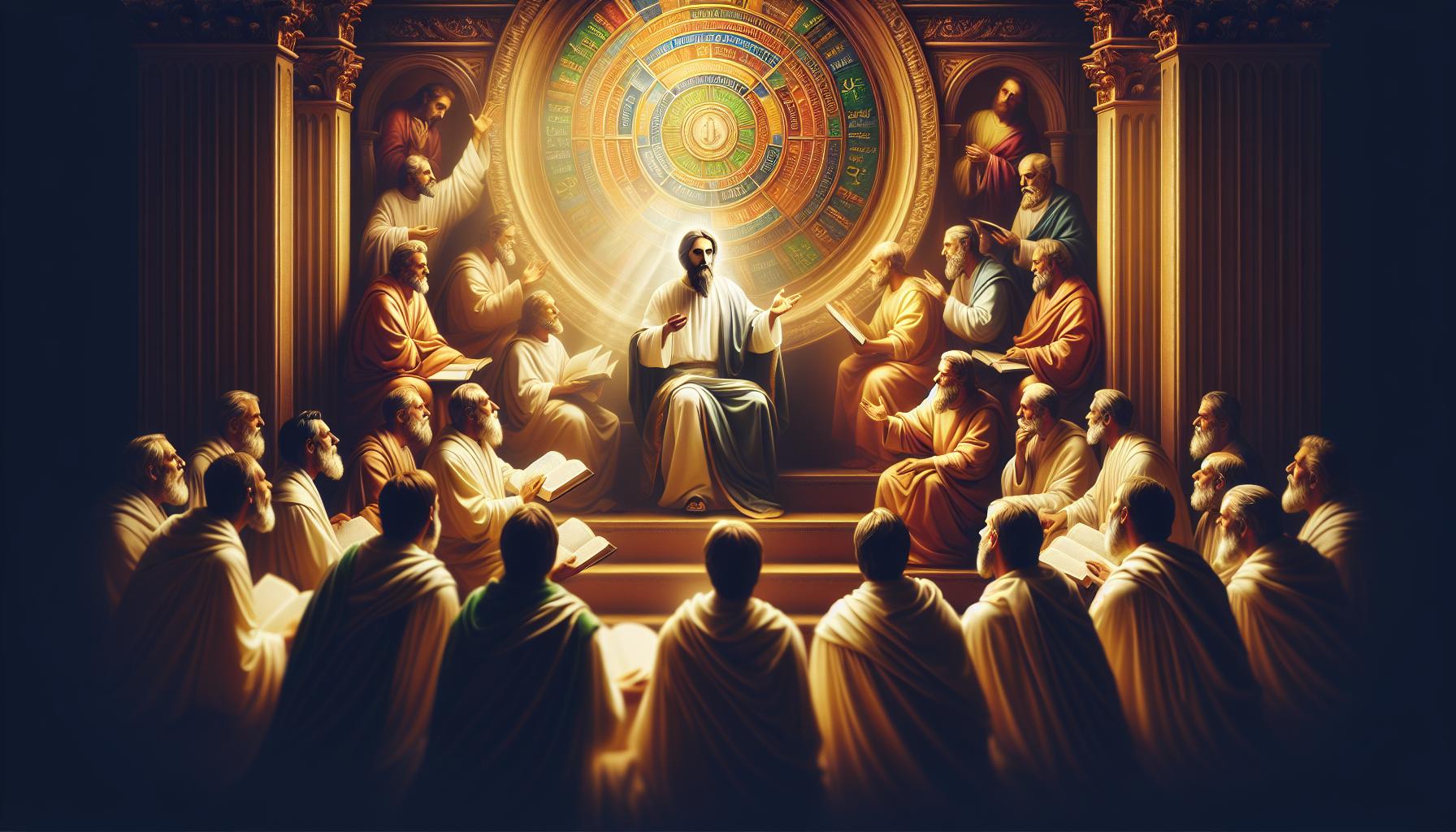What exactly does it mean to be a preacher, both in terms of its origins and its profound impact on spiritual communities? Understanding the etymology reveals not only the term’s historical roots but also its enduring significance in guiding faith and moral teachings. Explore how this role shapes lives and fosters connection in today’s world.
The Journey of the Word: Tracing the Roots of ‘Preacher’
The term ‘preacher’ carries with it the weight of history and tradition, encapsulating centuries of spiritual guidance and community influence. To fully appreciate the role of a preacher today, it’s essential to journey back through time and explore the etymological roots of the word, which reveal much about its significance in both religious and cultural contexts. Today, this term not only identifies a spiritual leader but also signifies someone who actively proclaims a message or truth, often serving as a moral compass within a community.
The word ‘preacher’ originates from the Latin word “praedicare,” which means “to proclaim publicly.” This foundational understanding suggests that the role of a preacher has always been tied to the act of sharing crucial information or spiritual teachings with others. Over time, this evolved into the Old French term “predicteur” before finding its way into Middle English as “precher.” Each linguistic iteration reflects the growing importance of this role in society, underscoring the idea that preachers are not merely conveyers of religious doctrine; they are pivotal figures in their communities, advocating for social justice, moral integrity, and spiritual well-being.
Etymological Evolution
The metamorphosis of ‘preacher’ through various languages is as fascinating as the role itself. To illustrate this historical journey, here’s a brief table summarizing its evolution:
| Language | Word | Meaning |
|---|---|---|
| Latin | Praedicare | To proclaim publicly |
| Old French | Predicteur | One who preaches |
| Middle English | Precher | Announcer of religious messages |
| Modern English | Preacher | Spiritual leader who proclaims faith |
As we unpack the essence of what it means to be a preacher today, we must also consider the spiritual significance woven throughout its history. Preachers serve as both teachers and shepherds, guiding their flock not only by delivering sermons but also by embodying the messages of love, hope, and redemption they preach. This duality highlights the inextricable link between the act of preaching and the art of living out one’s faith—essentially making the preacher a vital bridge connecting sacred texts with contemporary life challenges.
In practice, the responsibilities of a preacher extend well beyond the church walls. They engage in community outreach, ethical activism, and provide counseling, revealing the profound societal role they occupy today. By understanding the roots of the term ‘preacher,’ we gain insight into how spiritual leaders can inspire transformative change in both individual lives and broader communities, further enriching the legacy of faith.
Understanding the Role of a Preacher Across Different Faiths
Understanding the concept of a preacher transcends specific religious contexts; it embodies a pivotal role across various faiths that resonates with spiritual leadership, community engagement, and moral guidance. In essence, the term “preacher” has its roots in the Latin term “praedicare,” meaning “to proclaim,” hinting at the essential role of advocates for spiritual messages and ethical living in diverse cultures and belief systems.
Role in Christianity
In Christianity, preachers serve as essential figures within the church, tasked with elucidating scripture and guiding congregations toward spiritual fulfillment. They often engage in sermons, which are crafted to inspire, instruct, and sometimes challenge the beliefs or behaviors of their audience. The effectiveness of a preacher often hinges on their ability to connect with listeners, utilizing relevant anecdotes or parables to illustrate key points. Additionally, Christian preachers frequently take on pastoral responsibilities, offering counseling and support to individuals navigating life’s challenges.
Influence in Islam
In Islam, the preacher, or khutbah, commands respect as they convey teachings during communal prayers, particularly on Fridays. The khutbah serves not only as a source of guidance and wisdom but also as a reminder of one’s duties to both God and society. This role is crucial for fostering unity within the Muslim community and encouraging ethical behavior among followers. The significance of a preacher in Islam lies in their ability to address current issues and foster a deeper understanding of the faith, making their messages relevant to everyday life.
Voices Beyond Christianity and Islam
The role of a preacher is not exclusive to the Abrahamic traditions; many other religions also emphasize similar figures who serve to educate and inspire. For instance, in Buddhism, a monk may take on the role of a teacher, guiding followers through scriptures and philosophies aimed at achieving enlightenment. Similarly, in Hinduism, spiritual leaders such as gurus or swamis fulfill a comparable function by imparting knowledge on spiritual practices and ethical living.
- Christianity: Sermons, pastoral care, scriptural interpretation
- Islam: Khutbah as guidance, community engagement, current issues
- Buddhism: Monks as educators promoting enlightenment
- Hinduism: Gurus teaching spiritual practices and ethics
The function of a preacher across these various faiths underscores their importance in not merely transmitting religious philosophy, but in actively shaping the moral compass of their communities. Each tradition harnesses the unique skills of their preachers to address the particular spiritual and ethical challenges faced by their adherents while fostering a deeper connection to the divine and each other. Understanding the multifaceted role of these spiritual leaders allows for a greater appreciation of their contributions across different cultures and belief systems.
The Spiritual Responsibilities Embedded in Preaching
The role of a preacher transcends mere communication; it embodies a profound spiritual responsibility that shapes communities and individuals alike. At its core, preaching is an act of faith and service where the preacher takes on the mantle of guiding souls through the complexities of life. This intricate connection defines not only what does preacher mean but also what it signifies in terms of spiritual well-being and ethical leadership.
The Weight of Message
To effectively discharge the duties of a preacher, one must recognize the inherent weight of the message being delivered. Preachers wield words that can inspire, heal, or even challenge the status quo. Each sermon or teaching moment requires deep introspection and a commitment to truth, as the preacher’s insights can shape the beliefs and actions of their audience.
Consider some responsibilities that come with this calling:
- Clarity and Truthfulness: Preachers should strive to present messages rooted in honesty and integrity, fostering trust within their communities.
- Compassion and Empathy: Understanding the struggles of their audience allows preachers to connect deeply, offering guidance that resonates on a personal level.
- Cultural Relevance: Integrating contemporary issues into sermons speaks to the audience’s lived experiences and highlights the eternal truths of faith.
Building Community and Fostering Spiritual Growth
The act of preaching is not an isolated event; it plays a crucial role in building community. A preacher’s guidance can cultivate environments where spiritual growth flourishes, offering members the tools to navigate their own faith journeys. Cultivating an open dialogue encourages congregants to engage more deeply with their beliefs, exchange ideas, and provide mutual support.
To illustrate this impact, consider the following approaches that can enhance community interaction:
| Approach | Description |
|---|---|
| Interactive Sermons | Incorporating discussions or Q&A sessions can make sermons more engaging and relevant. |
| Workshops and Retreats | Organizing events that dive deeper into spiritual topics encourages communal learning and personal growth. |
| Service Projects | Engaging the community in outreach or charity projects can solidify bonds and demonstrate faith in action. |
In summary, require a delicate balance of authenticity, empathy, and communal engagement. By acknowledging the profound influence a preacher holds, one can appreciate how their teachings serve not only to inform but to transform lives. Understanding what does preacher mean encompasses this multifaceted role, emphasizing the importance of a preacher’s commitment to their spiritual duties and the well-being of their community.
The Art of Communication: How Preachers Connect with Their Congregations
Effective communication is at the heart of any preacher’s impact on their congregation. The art of connecting with an audience is not merely about delivering divine messages; it requires a deep understanding of human emotions, spiritual needs, and the nuances of language. A skilled preacher embodies the essence of what it means to lead through words, resonating with the congregation on multiple levels.
The Power of Storytelling
One of the most potent tools in a preacher’s arsenal is storytelling. By weaving relatable narratives into sermons, preachers can illustrate complex biblical concepts in ways that are accessible and meaningful. According to studies, individuals often remember stories far better than abstract teachings. This is particularly true in a religious context, where parables and personal testimonies can draw parallels to contemporary life, making spiritual lessons relevant and impactful.
- Relatable Examples: Utilizing everyday experiences can help congregants grasp spiritual truths.
- Use of Parables: These timeless stories from religious texts can clarify moral lessons.
- Personal Testimonies: Sharing one’s own journey can foster deeper connections and encouragement within the congregation.
Body Language and Vocal Variety
Non-verbal communication is another essential aspect preachers should master. A preacher’s body language, facial expressions, and vocal dynamics can significantly enhance the message being conveyed. Engaging body language that includes appropriate gestures can help emphasize important points, while a varied vocal tone can convey emotion effectively.
| Element | Impact on Communication |
|---|---|
| Gestures | Emphasize key messages and hold attention. |
| Facial Expressions | Convey empathy, joy, and sorrow, enhancing emotional connection. |
| Vocal Variety | Keep listeners engaged through changes in pitch and pace. |
Creating a Sense of Community
Last but not least, effective preachers prioritize fostering a sense of community among congregation members. This involves engaging them in dialogue rather than merely delivering a monologue. Encouraging questions, facilitating discussions, and creating opportunities for congregational involvement can transform the dynamic within a place of worship.
By understanding and applying the principles of effective communication, preachers can enhance their ability to connect meaningfully with their congregations. The etymology of the term “preacher” itself highlights the role of individuals in sharing profound messages—one that can only be fulfilled through mastery of communication, empathy, and connection. These elements not only enrich the spiritual experience but also fulfill the deeper calling originated in the very definition of being a preacher.
Etymology and Its Influence on Modern Preaching Practices
In tracing the roots of the term “preacher,” we delve into a rich tapestry of language and spirituality that not only tells us about the role of a preacher but also illuminates modern preaching practices. The term stems from the Old French *precher*, which means “to proclaim or announce.” This etymology is significant as it underscores a fundamental aspect of preaching: the act of delivering a message, often one of great importance, to an audience. This cultural and linguistic heritage influences how preachers communicate today, driving them to embody the essence of their role as heralds of spiritual truths.
The Historical Evolution of Preaching
Understanding the historical evolution of the word “preacher” provides insight into current practices. Over centuries, the role of a preacher has transformed, yet the core understanding remains rooted in the act of proclamation. Consider the following thematic transitions:
- From Proclamation to Engagement: Historically, preaching was often a one-way communication channel; modern preaching emphasizes interaction and community involvement.
- The Sacred Texts’ Influence: Preachers now frequently draw upon a myriad of texts—biblical, philosophical, and contemporary—to enrich their messages.
- Multimedia and Technology: Today, preaching incorporates various mediums like podcasts, videos, and live streams that challenge and expand the traditional understanding of what it means to preach.
These shifts are a direct result of interpreting the etymology of the word in light of contemporary society’s needs. Preachers are now tasked with not only sharing the message but also making it relevant to the lives of their listeners.
The Spiritual Significance in Modern Contexts
The spiritual significance rooted in the etymology of “preacher” reverberates through the methods used in today’s preaching. This is manifested in several practical applications:
- Storytelling Techniques: Preachers often use narrative techniques to make spiritual teachings relatable. This type of engagement fosters a deeper connection with congregants.
- Community Dialogue: Facilitating discussions around scripture allows congregations to explore meaning together, reinforcing the communal aspect of faith.
- Cultural Relevance: Integrating local and contemporary issues into sermons addresses the lived experiences of congregants, making spiritual teachings applicable in their daily lives.
The dynamic interpretation of “preacher” encourages a holistic approach that resonates with diverse audiences, illustrating that modern preaching practices are as much about listening and engaging as they are about proclaiming.
| Historical Aspect | Modern Interpretation |
|---|---|
| One-way communication | Interactive dialogue |
| Hierarchical structure | Community engagement |
| Strict adherence to texts | Contextual application of teachings |
| Physical gatherings | Virtual services and outreach |
By recognizing how the etymology of the word “preacher” has shaped modern practices, religious leaders can adapt their strategies to fulfill their roles effectively. This dynamic understanding paves the way for more meaningful, impactful preaching that speaks directly to the complexities of contemporary life.
The Impact of Cultural Context on Preaching Styles
The way a message is delivered can greatly affect its reception, and nowhere is this more evident than in the diversity of preaching styles influenced by cultural contexts. Across different regions and communities, the interpretation of sermons changes, shaped by historical backgrounds, traditions, and societal values. Understanding these nuances not only enriches the experience of congregants but also enhances the effectiveness of the preacher’s message.
Elements Influencing Preaching Styles
Several key factors contribute to how preaching styles evolve in various cultural contexts:
- Historical Background: The history of a community, including religious influences and significant events, often dictates the tone and themes of preaching.
- Language and Dialect: The choice of language, vernacular, or dialect directly impacts how messages resonate with congregants. For example, a local idiom might make the sermon more relatable.
- Cultural Traditions: Rituals, values, and customs play a pivotal role in shaping the delivery and content of sermons. In cultures where storytelling is significant, narratives may dominate preaching.
- Audience Demographics: The age, profession, and life experience of the congregation can influence preaching styles. Younger audiences may resonate more with contemporary references, while older audiences might prefer traditional approaches.
Comparative Styles Across Cultures
To illustrate this impact, let’s look at a simplified comparison of preaching styles across different cultural contexts:
| Culture | Preaching Style | Characteristics |
|---|---|---|
| African | Call-and-Response | Engaging, participatory, rhythmic |
| Western | Lecture | Structured, analytical, focused on doctrine |
| Asian | Storytelling | Narrative-driven, emphasizes moral lessons and community values |
| Latin American | Soulful and Emotional | Passionate, highly expressive, often includes music |
These styles reflect the underlying principles and values of their respective cultures. For instance, in many African communities, the call-and-response method fosters a sense of community and shared experience, while Western contexts may emphasize a more lecture-based approach focused on doctrinal accuracy.
Incorporating the cultural significance of language and tradition gives preachers a broader toolkit for communication. By embracing the unique aspects of their cultural context, preachers can connect more deeply with their congregants, ensuring that their messages—whether derived from the etymology of the word “preacher” or its spiritual implications—resonate profoundly and authentically within their communities.
Embracing Diversity: The Preacher’s Role in an Inclusive Faith Community
In a world as diverse as ours, the role of a preacher transcends merely delivering sermons. Instead, it encompasses the significant responsibility of fostering an inclusive faith community that welcomes individuals from all walks of life. This commitment not only reflects the core principles of many religious teachings but also highlights the profound impact of understanding the etymology and spiritual significance behind the term “preacher.” By recognizing the origins of this term, one can appreciate how it embodies the essence of unity and acceptance.
Understanding the Preacher’s Mission
A preacher is often viewed as a spiritual leader, tasked with guiding their congregation toward a deeper understanding of faith. However, this role also requires a commitment to embracing the unique backgrounds and experiences of each member of the community. Here are some essential aspects of this mission:
- Open Dialogue: Creating spaces for open discussion about diversity can help bridge gaps between different cultural and societal perspectives. Preachers can facilitate these conversations by addressing relevant topics within their teachings.
- Education and Awareness: By educating their congregations about various cultural and social issues, preachers can foster empathy and understanding among members. Offering workshops or seminars that focus on inclusion can be beneficial.
- Inclusive Practices: Implementing inclusive practices within worship services—such as multilingual services, accessibility options, and diverse representation—can make all members feel welcome and valued.
Real-World Examples of Inclusion
Many faith communities have successfully integrated diverse practices that reflect their commitment to inclusivity. Take the example of a local church that celebrated a multicultural day, showcasing various traditions through music, food, and shared stories from members of the congregation. This not only enriched the experience of worship but also provided a platform for individuals to share their cultural identities, reinforcing the concept that every individual contributes uniquely to the community’s spiritual tapestry.
Additionally, preachers can leverage technology to reach wider audiences. Live-streaming services or creating online discussion groups can connect individuals who might otherwise feel alienated in a traditional setting. By examining the etymological roots of “preacher” and its broader spiritual significance, communities can effectively adapt and grow, ensuring that everyone feels a sense of belonging.
Practical Steps for Embracing Diversity
To foster a truly inclusive environment, consider implementing the following strategies within your faith community:
| Strategy | Description | Expected Outcome |
|---|---|---|
| Community Events | Organize events that celebrate different cultures and traditions. | Strengthened relationships and mutual respect among members. |
| Training Seminars | Host training on diversity, equity, and inclusion for leadership. | Informed leaders who can champion inclusion initiatives. |
| Feedback Mechanisms | Establish anonymous feedback channels for members to express their concerns. | Improved adaptability and responsiveness to community needs. |
Through these actions, preachers not only fulfill their traditional roles but also stand as champions of diversity and inclusion within their faith communities. By weaving together the threads of individual experiences and beliefs, they create a richer, more vibrant tapestry that truly embodies the spirit of unity and understanding.
The Transformative Power of Preaching: Inspiring Change and Growth
Throughout history, the art of preaching has served as a powerful catalyst for social, personal, and spiritual transformation. The word “preacher,” derived from the Latin “praedicator,” which means “one who proclaims,” emphasizes the authority and responsibility inherent in this role. When understood deeply, preaching goes beyond mere communication; it becomes a pivotal force that inspires change and fosters growth in individuals and communities.
The Role of Preaching in Inspiring Change
Effective preaching can ignite change on multiple levels. Here are some ways it achieves this transformative impact:
- Empowerment: By sharing relatable stories and profound truths, preachers empower individuals to confront their challenges and ignite their passions.
- Encouragement: Uplifting messages offer hope and motivation, encouraging congregants to make positive changes in their lives.
- Critical Reflection: Preaching invites listeners to reflect critically on their values and behaviors, prompting necessary self-evaluation and growth.
For example, during times of societal upheaval, sermons have often rallied communities toward justice and reform, reinforcing the preacher’s role as a moral compass. The spiritual significance of preaching frequently leaves lasting impressions, pushing listeners to engage actively with their faith and the world around them.
Growth Through Community Engagement
The communal aspect of preaching also plays a vital role in fostering growth. A preacher’s message often encourages collective actions, forming networks of support and understanding among congregants. This communal engagement can lead to:
- Stronger Relationships: As individuals come together in fellowship, they create bonds that encourage personal and spiritual growth.
- Service to Others: Many sermons call for active involvement in service, allowing congregants to express their faith in tangible ways.
- Shared Learning: Engaging in discussions around sermons fosters an environment of shared learning and collective wisdom.
This sense of community not only enhances the impact of a preacher’s message but also cultivates an ongoing dialogue about faith, morality, and personal responsibility, ultimately leading to profound changes in individuals’ lives.
Practical Steps for Harnessing the Power of Preaching
To experience the transformative power of preaching, both preachers and congregations can adopt certain practices:
| Action | Description |
|---|---|
| Engage with Scripture | Encourage regular study and application of biblical principles to everyday life. |
| Create Discussion Groups | Facilitate small groups that reflect on sermons and provide support for applying teachings. |
| Invite Accountability | Establish mentorship relationships that help congregants stay committed to personal growth. |
| Promote Service Projects | Encourage participation in community service to foster a practical expression of the delivered messages. |
By implementing these actionable steps, congregants can deepen their understanding of the spiritual significance behind preaching, enabling them to harness its transformative power for personal and collective growth.
Faq
What Does Preacher Mean: Etymology and Spiritual Significance Explained?
The term “preacher” refers to an individual who proclaims religious messages or sermons, often within a societal or spiritual context. Its etymology traces back to the Latin word “praedicare,” meaning to proclaim or announce.
The role of a preacher is crucial in various religious traditions, as they convey teachings, inspire congregations, and often serve as spiritual leaders. They communicate essential doctrines and help foster community through their messages, connecting deeply with congregants.
How is the term ‘preacher’ used in different religious contexts?
The role of a preacher varies significantly across different faiths. In Christianity, for instance, they often deliver sermons based on scripture. In Buddhism, a similar figure may share teachings to guide followers.
Each religion has its unique customs and expectations surrounding preaching. In some denominations, preachers are ordained individuals, while others may allow anyone to speak in public gatherings, highlighting a diversity of practices. Understanding how the term applies can enrich your spiritual journey.
Why does understanding the etymology of ‘preacher’ matter?
Understanding the etymology of the term “preacher” helps deepen our appreciation for the role. It highlights a tradition of proclamation and emphasizes the historical roots of spiritual communication.
By studying the language, we can better connect with the significance of the messages conveyed during sermons and other forms of preaching. This understanding can enhance both personal faith and community experience, aiding reflection on the essential aspects of spiritual life.
Can I become a preacher without formal training?
Yes, many individuals feel called to preach without formal training. A strong passion for sharing your faith and a commitment to studying scriptures can empower you to speak publicly.
While formal training can be beneficial and provide important skills, many communities value personal experience and heartfelt communication. It’s essential to remain grounded in your beliefs and continuously seek spiritual growth, which can be complemented by mentorship or community involvement.
What types of messages do preachers typically share?
Preachers typically share messages about faith, hope, and redemption, aimed at encouraging spiritual growth and connecting with their congregation.
Common themes include addressing life’s challenges, exploring moral dilemmas, and interpreting religious texts. Preachers may also discuss contemporary issues through the lens of their faith, striving to apply age-old teachings to modern life.
Why do preachers emphasize community involvement?
Preachers emphasize community involvement to foster a sense of belonging and shared purpose among congregants. This engagement is vital for spiritual and personal development.
By encouraging community service and outreach, preachers help individuals live out their faith actively, impacting others positively. Community involvement strengthens the church’s mission, promotes spiritual growth, and deepens connections among members.
What is the spiritual significance of a preacher’s role?
The spiritual significance of a preacher’s role lies in their ability to bridge divine teachings and everyday life, guiding individuals in their faith journey.
As teachers and counselors, preachers help individuals navigate challenges, find purpose, and deepen their commitment to spiritual practices. Their influence extends beyond sermons, often shaping the moral and ethical frameworks of their communities.
Concluding Remarks
As we conclude our exploration of the term “preacher,” we find ourselves enriched by its rich etymology and profound spiritual significance. Rooted in the act of proclaiming and spreading vital messages, the role of the preacher transcends mere words to encompass a commitment to nurture faith, build community, and inspire spiritual journeys. We’ve examined how this word, steeped in theological heritage, invites us to reflect on our own engagements with the divine and our responsibilities within our communities.
By understanding the historical context and significance of preaching, we can appreciate the diverse interpretations across different religious traditions. This knowledge empowers us to engage more deeply in our own spiritual practices, whether as a preacher or a member of the congregation seeking inspiration.
We encourage you to continue your exploration of this sacred calling. Read more about varied preaching styles, the impact of preaching on spiritual life, and how the act of sharing faith can influence not just individuals but entire communities. Share your thoughts and experiences in the comments below—your voice matters in the dialogue of faith. Let us journey together in understanding and embracing the transformative power of preaching!




